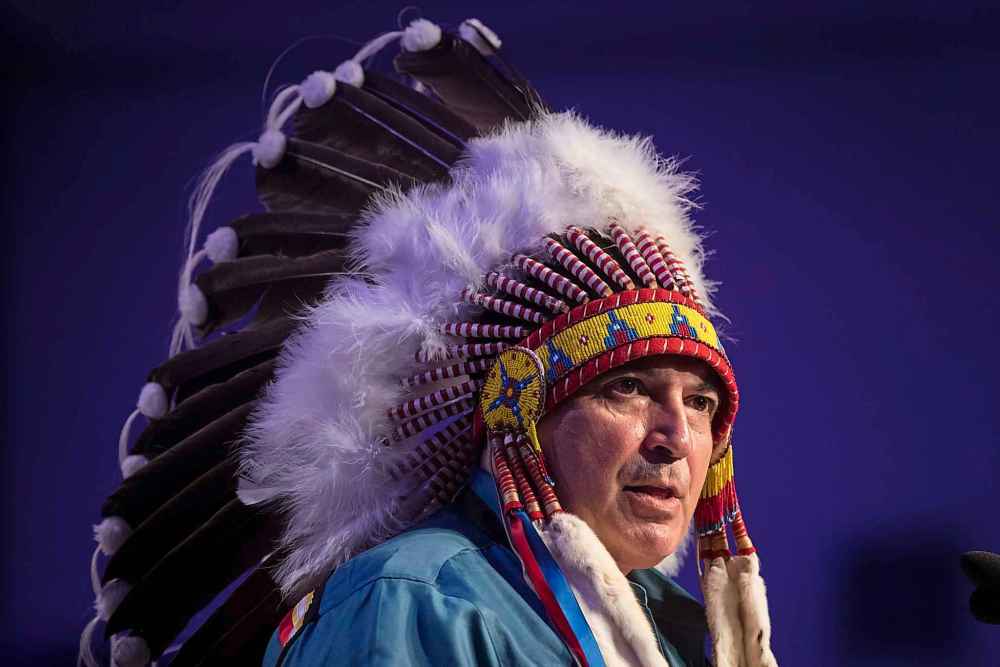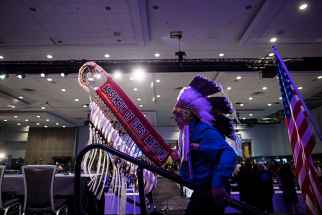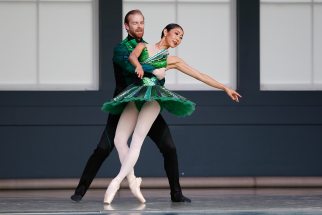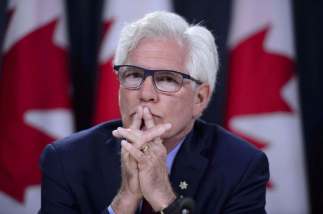AFN expected to re-elect Bellegarde as national chief MKO's North one of two Manitoba women on ballot
Read this article for free:
or
Already have an account? Log in here »
To continue reading, please subscribe:
Monthly Digital Subscription
$0 for the first 4 weeks*
- Enjoy unlimited reading on winnipegfreepress.com
- Read the E-Edition, our digital replica newspaper
- Access News Break, our award-winning app
- Play interactive puzzles
*No charge for 4 weeks then price increases to the regular rate of $19.00 plus GST every four weeks. Offer available to new and qualified returning subscribers only. Cancel any time.
Monthly Digital Subscription
$4.75/week*
- Enjoy unlimited reading on winnipegfreepress.com
- Read the E-Edition, our digital replica newspaper
- Access News Break, our award-winning app
- Play interactive puzzles
*Billed as $19 plus GST every four weeks. Cancel any time.
To continue reading, please subscribe:
Add Free Press access to your Brandon Sun subscription for only an additional
$1 for the first 4 weeks*
*Your next subscription payment will increase by $1.00 and you will be charged $16.99 plus GST for four weeks. After four weeks, your payment will increase to $23.99 plus GST every four weeks.
Read unlimited articles for free today:
or
Already have an account? Log in here »
Hey there, time traveller!
This article was published 24/07/2018 (2701 days ago), so information in it may no longer be current.
OTTAWA — The Assembly of First Nations will pick its national chief Wednesday, in a vote that will set the tone as Ottawa navigates pipelines, land claims and its vision for reconciliation.
Hundreds of chiefs are gathered in Vancouver for the election, where two Manitoba women are among the five candidates on the ballot.
Sheila North has served since 2015 as the first female Grand Chief of the northern Manitoba Keewatinowi Okimakanak. The former broadcast journalist gained national prominence while calling for a national inquiry into missing and murdered Indigenous women.

North grew up on the remote Bunibonibee Cree Nation, and has lived in Winnipeg since age 15. She’s one of the three candidates who have attracted the most attention, including on social media, which plays an even larger role on reserves than federal parties do in national elections. But she is not widely considered a frontrunner in the race.
When North launched her campaign in May, she stressed that the AFN should be more of a conduit between First Nations chiefs and the federal government, instead of negotiating on their behalf:
“The pendulum was so far in one way that the government called the shots, and now we’re seeing it go the other way and they’re trying to contain it, and I don’t think they can contain it much longer,” North had said.
Tara Williamson, a University of Winnipeg instructor in Indigenous governance, wrote in a recent analysis that North will have to translate that into clear positions on issues such as dams and pipelines.
“Her biggest challenge will be balancing her passion for community-led initiatives with strong, tangible policy positions that hold weight at the national level — for First Nations and the federal government,” Williamson wrote for the Yellowhead Institute, a new think-tank focusing on Indigenous self-determination.
The AFN has elected 11 chiefs, all male, since it began as the National Indian Brotherhood in 1968, though there have been female candidates previously.
Most analysts say incumbent National Chief Perry Bellegarde has the best shot at winning, though media reports have suggested an uptick in support for Russ Diabo, a longtime policy analyst from a Quebec reserve.
Bellegarde has focused on “closing the gap” in education and employment between First Nations and other Canadians — a disparity that economists with the Centre for the Study of Living Standards found will cost Manitoba 11 per cent of its workforce growth over next two decades.
The former top chief for Saskatchewan, Bellegarde has claimed success as national chief in his pledges for language funding, the national inquiry and predictable federal funding. But Williamson pointed out that those commitments have come under a sympathetic Liberal government, which might not be in office after the fall 2019 national election.
Meanwhile, Diabo feels Ottawa has co-opted Indigenous rights and that the AFN should strike a more adversarial tone in defence of treaty rights. He has released arguably the most detailed platform of the five candidates, one that outright opposes the Trans Mountain project. “Diabo might be considered the populist candidate of this race,” Williamson wrote.
The two other candidates have received far less media coverage.

Katherine Whitecloud has served as chief of Sioux Valley First Nation west of Brandon and has a background in both education and leadership.
“Whitecloud’s platform is based on traditional knowledge and governance roles,” which involves focusing on revitalizing languages, social cohesion and ties to the land, Williamson wrote.
Pipeline, treaty rights loom for AFN head
The national chief of the Assembly of First Nations has a four-year term to lead the organization that represents almost all First Nations people in negotiations with the federal government — while also navigating the reality that Ottawa funds the AFN.
The national chief of the Assembly of First Nations has a four-year term to lead the organization that represents almost all First Nations people in negotiations with the federal government — while also navigating the reality that Ottawa funds the AFN.
The looming four-year term will likely surround the chasm along the Trans Mountain pipeline route, where some First Nations are prepared to go to jail in opposing the pipeline’s widening in their territories, while others have carved out revenue and employment deals with Kinder Morgan, the pipeline’s owner until suspending construction of its expsnsion project triggering Ottawa’s decision to take it over.
More immediately, the AFN will have to contend with the federal Liberals’ looming “rights-recognition framework,” a document that the government says will clarify the rights and responsibilities associated with treaties and land claims, but opponents fear will instead undermine them.
Ottawa has said the yet-to-be-written legislation would help avoid constitutional squabbles that led to the Kapyong Barracks saga, though some analysts fear that what Ottawa has discussed in consultations would degrade First Nations’ ability to contest projects in court and get a fair share of resource projects.
Provincial grand chiefs are also watching closely as Manitoba and other governments reform child-welfare rules. Chiefs will also likely scrutinize next spring’s final report by the troubled inquiry into missing and murdered Indigenous women.
— Dylan Robertson
Longtime B.C. chief Miles Richardson is an environmentalist who touts economic-development projects as a requirement to achieve self-government, though critics claim his approach could undermine existing treaty rights.
Each reserve gets one vote Wednesday, either by its chief or a designate, regardless of the First Nation’s population. That skews the share of the 636 total votes to British Columbia, which has more ballots than all three Prairie provinces combined.
Chiefs in Vancouver will vote in as many rounds as it takes for a candidate to get 60 per cent support. That usually means multiple ballots, each eliminating the candidate with the least support. Sometimes, that has meant a process that continues late into the night.
Even the number of rounds required can illustrate how First Nations chiefs feel about the current government. For example, Bellegarde winning on the first or second ballot would suggest chiefs support his co-operative tone with Ottawa, while a protracted battle between Bellegarde and Diabo might indicate a split in thinking over how cosy AFN should be with the Liberals.
dylan.robertson@freepress.mb.ca









